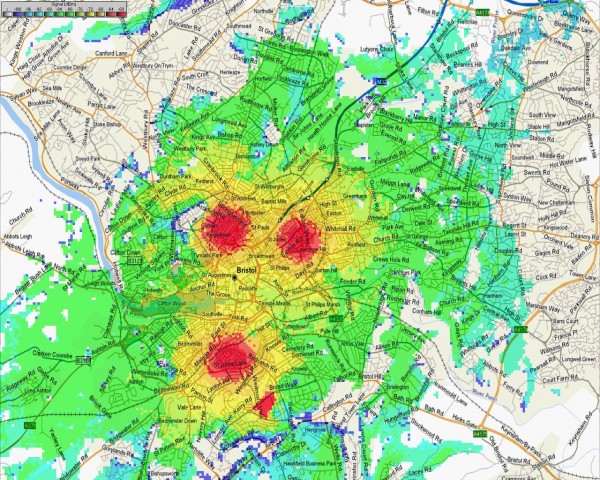GPS in BS next weekend
On 24 and 25 February 2007, OpenStreetMap volunteers will be adding Bristol to the global mapping revolution. Contributors to the OpenStreetMap (OSM) project are meeting in Bristol with the aim of completely mapping the streets and other major features of the city.Anyone wishing to take part in the mapping weekend are asked to meet at Watershed, 1 Canons Road, Bristol at 10.00 am on either or both days to collect GPS mapping units before going their separate ways to map the city for the rest of the day, with a brief get-together for lunch at convenient pubs. In addition, participants will also be contributing to gathering data for Connecting Bristol’s Wi-Map project, which is currently mapping open wireless networks around the city.
The OSM project was started in 2004 to enable anyone to use maps in creative, productive or unexpected ways. The use of traditional maps is hampered by legal and technical restrictions that severely curtail their use. The OSM project aims to create free geographical data, like street maps, that can be used anywhere by anyone. OSM contributors, will be driving, cycling, and wandering the city with GPS units recording the routes of as many streets, cycleways and footpaths as possible. The tracks recorded over the weekend will be added to the online OpenStreetMap.org database where anyone in the world with access to the internet can browse, annotate, reference, edit and use the data.
Collaborative mapping is a rapidly growing activity and is being driven in part by technology (cheap GPS equipment and online collaboration tools such as OpenStreetMap.org). Projects such as this have as their prominent feature their knowledge production and ownership ethos. Under such open-source models, rights of authorship are decentralised and the knowledge gathered is seen as a common resource that can be distributed and re-used without restriction or licence. This approach has real potential to enable people to create their own knowledge and encourages re-use of cartographic resources in novel and creative ways.
The map data produced over the weekend will contribute to OpenStreetMap.org, one of the leading projects in the open-source mapping field. Currently, OSM has mapped large portions of the country, including all the motorways and most primary roads. We hope that an intensive effort to build a map of the whole of a city in a weekend will inspire others and help to build momentum across the country. As an open organisation with no membership requirements, we welcome the participation of anyone, young or old, who will be in Bristol on the weekend of the 24 and 25 February. Anyone interested in taking part should contact Steve Coast (steve at asklater dot com) or Andy Robinson (andy at ukstreetwise dot com). Alternatively, you could visit the Bristol wiki page and either add your name to the or find out more about the project.


 The Register reports that in a recent anti-trust case, the US Court of Appeals for the Seventh Circuit has ruled that free software (that’s free as in speech, not beer!) and the General Public License (GPL) under which most free software is released are both legal.
The Register reports that in a recent anti-trust case, the US Court of Appeals for the Seventh Circuit has ruled that free software (that’s free as in speech, not beer!) and the General Public License (GPL) under which most free software is released are both legal.